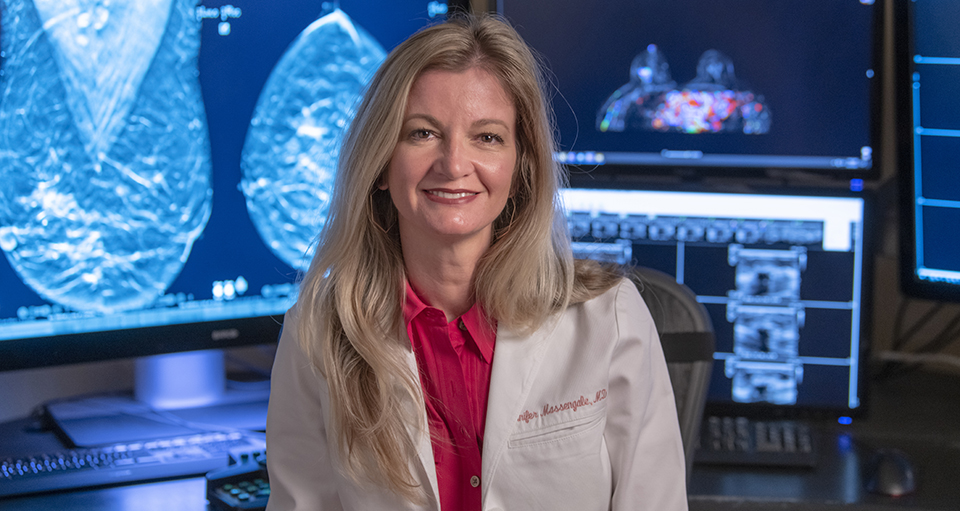Mammography

Our Breast Imaging Services
The breast radiology team at Olathe Health provides advanced imaging in an environment designed just for our breast care patients. As part of the Nationally Accredited Breast Care program, our breast radiology experts work closely with our other breast cancer care services, including breast surgery, high-risk breast clinic, leading-edge oncology care and patient-focused nurse navigators.
Mammogram Screening Recommendations
Mammograms are specialized X-rays of the breast used to identify changes in the breast tissue. It is used to detect and diagnose breast disease in women who either have breast problems such as a lump, pain or nipple discharge, as well as for regular recommended breast cancer screenings. Mammography cannot prove that an abnormal area is cancer, but if it raises a significant suspicion of cancer, your doctor may order additional testing or a biopsy.
Women at Average Risk
Per the American Cancer Society, these guidelines are for women at average risk for breast cancer. For screening purposes, a woman is considered to be at average risk if she doesn’t have a personal history of breast cancer, a strong family history of breast cancer, or a genetic mutation known to increase risk of breast cancer (such as in a BRCA gene), and has not had chest radiation therapy before the age of 30.
- Women between 40 and 44 have the option to start screening with a mammogram every year.
- Women 45 to 54 should get mammograms every year.
- Women 55 and older can switch to a mammogram every other year, or they can choose to continue yearly mammograms. Screening should continue as long as a woman is in good health and is expected to live 10 more years or longer.
Our breast imaging navigator, Susan Smith, is available to assist with appointments and answer questions to help make your experience with us as seamless as possible. Susan can be reached by calling 913-355-4765.
Women at High Risk
Women who are at high risk for breast cancer based on certain factors should get an MRI and a mammogram every year, typically starting at age 30. This includes women who:
- Have a lifetime risk of breast cancer of about 20% to 25% or greater, according to risk assessment tools that are based mainly on family history
- Have a known BRCA1 or BRCA2 gene mutation (based on having had genetic testing)
- Have a first-degree relative (parent, brother, sister, or child) with a BRCA1 or BRCA2 gene mutation, and have not had genetic testing themselves
- Had radiation therapy to the chest when they were between the ages of 10 and 30 years
- Have Li-Fraumeni syndrome, Cowden syndrome, or Bannayan-Riley-Ruvalcaba syndrome, or have first-degree relatives with one of these syndromes
The American Cancer Society recommends against MRI screening for women whose lifetime risk of breast cancer is less than 15%.
Awards & Accreditations
-
Accredited Breast Care Program
-
Accredited by the Commission on Cancer with Commendation in the Community Hospital Cancer Program
-
Member of the Masonic Cancer Alliance
Breast Imaging Services
-
3D mammography (also called breast tomosynthesis) is available at the Women’s Imaging Suite in the Olathe Health Pavilion and at Miami County Medical Center. 3D mammograms help doctors to look at breast tissue in dozens of tiny layers, which means more precise imaging to reduce unnecessary, and sometimes worrisome callbacks. 3D mammography is especially effective for invasive and hard-to-find cancers, and for women who are high risk or who have dense breast tissue.
A $60 out-of-pocket charge may apply for a 3D mammogram, depending on your insurance coverage. It’s best to speak to your insurer before scheduling to verify benefits.
-
Our team is led by a fellowship-trained breast radiologist. Jennifer Massengale, MD, has completed a formal residency specializing in advanced breast imaging and breast procedures. Dr. Massengale only reads breast imaging and cares solely for patients with breast health issues.
-
Our breast imaging navigator, Susan Smith, is available to assist with appointments and answer questions to help make your experience with us as seamless as possible. To get in touch, call 913-355-4765.
-
The Breast Care Center at Olathe Medical Center is accredited by the National Accreditation Program for Breast Centers. This means our patients get comprehensive care with state-of-the-art services and a multidisciplinary team approach to coordinate the best treatment options.
-
Olathe Health continues to invest in top-of-the-line breast imaging technology, including:
- Digital mammography (tomosynthesis), including upright 3D stereotactic mammography: creates three-dimensional pictures of the breast to detect breast cancer earlier
- Breast ultrasound: uses sound waves to evaluate breast tissue
- Breast MRI: generates detailed images of the breast using a large magnet and radio waves
- Interventional breast procedures, to remove a sample of breast tissue for biopsy using minimally-invasive techniques, including:
- Ultrasound-guided core biopsies
- Stereotactic core biopsies (3D)
- MRI-guided core biopsies
-
We provide most of our breast radiology services within the tranquil, spa-like setting of the Olathe Health Pavilion. Addressing women’s special health concerns, the Women’s Imaging Suite offers mammography and other diagnostic procedures, such as ultrasound and bone density/osteoporosis testing. Imaging is provided within a private environment, with a focus on making patients as comfortable as possible.
-
Olathe Health offers a high-risk breast clinic for individuals at an increased risk of developing breast cancer due to personal risk factors. Our nurse practitioner, Melanie A. Knight, APRN, CRNFA, will meet with you on a regular basis to assess and monitor your breast health and to pro-actively manage your risk. Early detection is key to successfully treating breast cancer.
You might be a candidate for our high-risk breast clinic if you:
- Have a family history of breast cancer
- Have had an abnormal mammogram
- Have a known BRCA1 or BRCA2 gene mutation (based on having had genetic testing)
- Have a first-degree relative (parent, brother, sister, or child) with a BRCA1 or BRCA2 gene mutation, and have not had genetic testing themselves
If you think you might be a candidate for our high-risk breast clinic, talk with your primary care provider about a referral, or call Melanie Knight at 913-782-8577.
Let’s Talk Mammograms
There is a 1 in 8 chance a woman will develop breast cancer, according to the American Cancer Society. The best protection you have is to get a mammogram.

